
Michiel Westenberg advocates prevention for social anxiety: ‘Why wait until the damage has been done?’
Shyness is perfectly normal, Michiel Westenberg stated in his farewell lecture. But that doesn’t mean that social anxiety shouldn’t be identified and addressed in good time. ‘Serious shyness has strong genetic roots; you don’t just get over it.’
‘Yes, there have been tough times,’ Michiel Westenberg admitted when tidying up his room as he came across projects that never got off the ground: grant applications that weren’t honoured. ‘But I’m not going over it again,’ he continued quickly. ‘Time is ticking on.’
When Westenberg announced two years ago that he intended to retire when he reached the age of sixty-seven, he took his colleagues by surprise: ‘What? You don’t have to retire, do you?’ ‘Well, just assume that I do.’ His most ambitious plan now is probably simply ‘not to give myself any more commitments.’ OK, until next spring there are still two projects that will take up more time. A study on eye contact, and supervising a PhD project in which he has been closely involved since the start. But his ‘actual’ farewell symposium, on Friday 25 October, is now behind him. He looks back on it as a very happy occasion: ‘It was a fantastic farewell gift.’
Informal atmosphere
Colleagues from his research group had organised an afternoon that mirrored how Westenberg likes to work: in a lively dialogue with all kinds of partners from the Anxiety and Stress Knowledge Centre. There were journalists, entrepreneurs, therapists, lecturers present. ‘We chose deliberately for a small setting, in an informal atmosphere in the restaurant of the Faculty Club. No cameras, no livestream, no iPhone recording it all. Westenberg points to the telephone on the table. ‘The discussions were fantastic, and afterwards I did think it was a pity we hadn’t recorded them. But If we’d done that, it would have had a much less personal feel.’ The reactions to the format were very enthusiastic. ‘I heard from people that they also want to integrate it in the Healthcare programme, as a counterbalance to the often detached, cognitive approach. If I see that this format is repeated and that it inspires people, oddly enough that will make it easier for me to leave.’
-
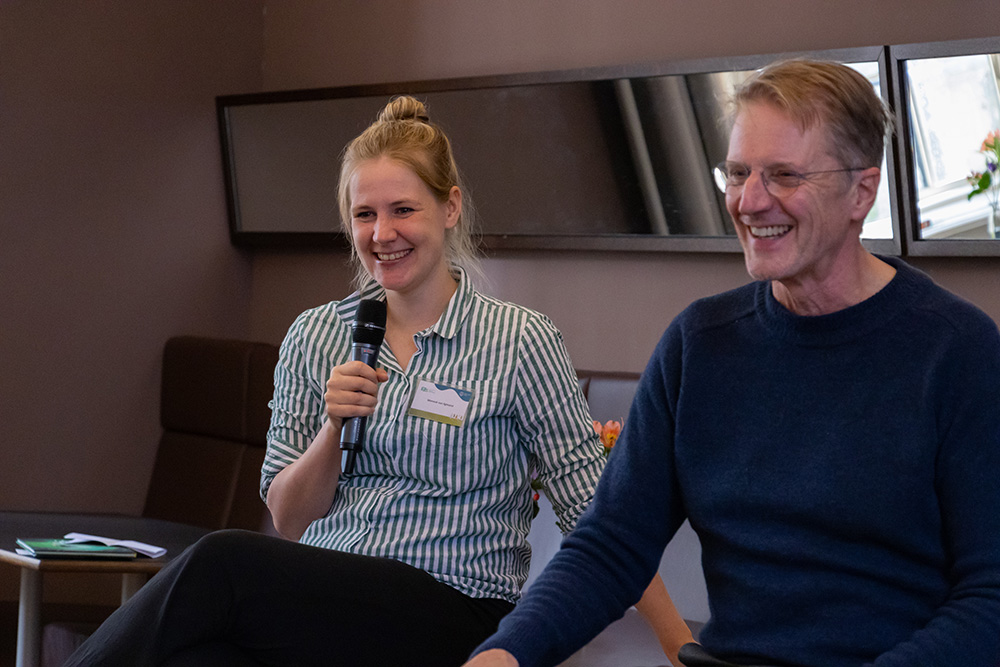
Westenberg in conversation with Manouk van Egmond, author of 'Zelfs vogels zijn verlegen' -
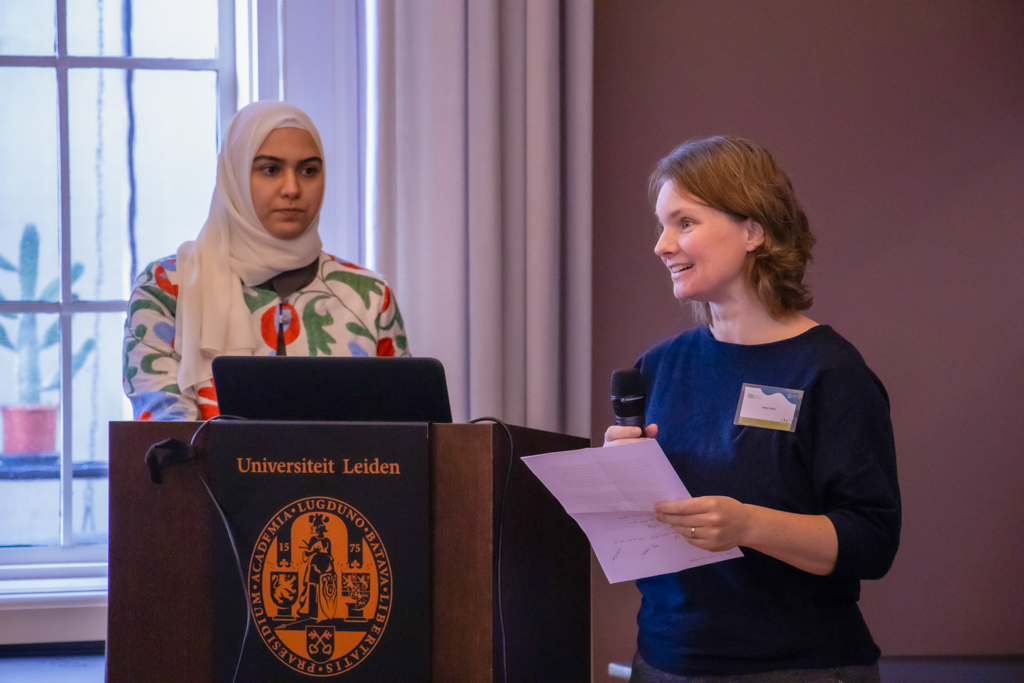
Left: assistant professor Semiha Aydin, right: Anke Klein, associate professor co-founder of Knowledge Centre Anxiety and Stress in Youth. -
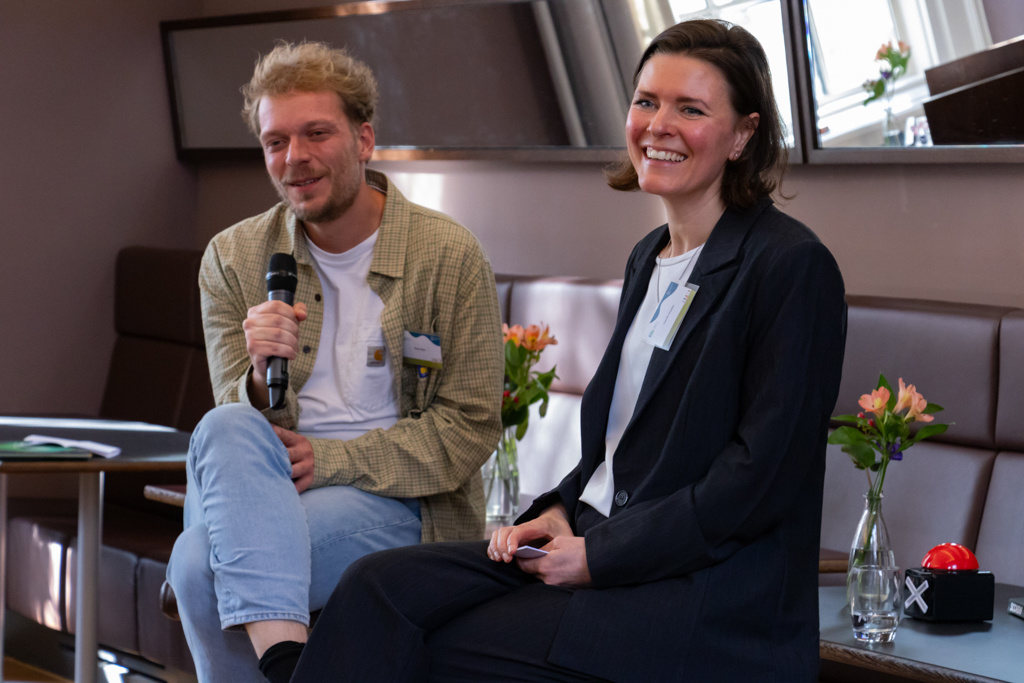
Tom Pilon, prevention worker at Youz, with assistant professor Leonie Vreeke, who researches anxiety in toddlers. -
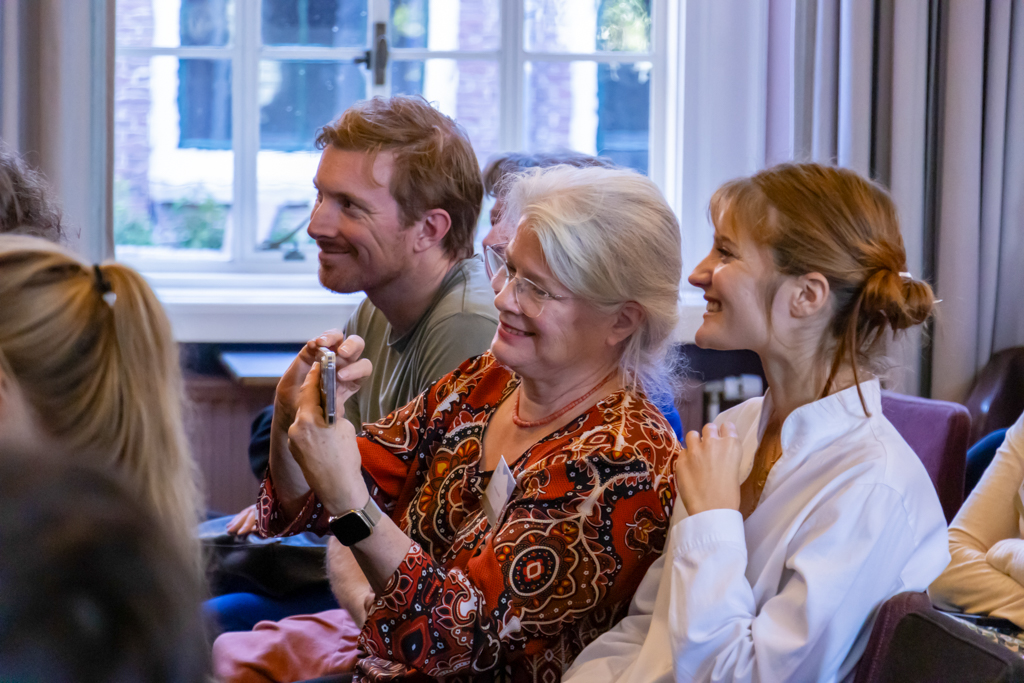
Proud family members. -
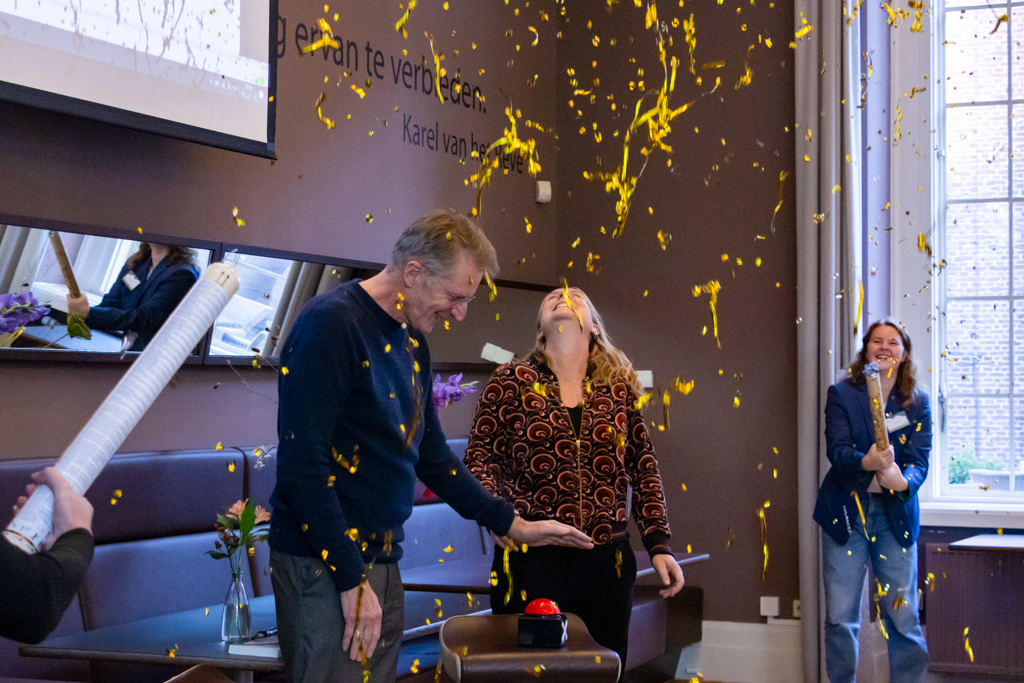
The knowledge centre's new website is launched.
Shyness is normal
Westenberg has devoted most of his academic career to research on social anxiety. He prefers the term shyness. ‘In Mental Healthcare, people talk about social anxiety because shyness has by then got completely out of hand. ‘But “shyness” is a perfectly good term, one that we also use in recruiting people for our research. It always brought a lot of reactions, because it appeals to people; they don’t feel stigmatised. It’s actually very normal.’
He repeats his message: ‘Shyness is a trait that is normally distributed over the human population. And over the animal kingdom; even birds can be shy.’ This statement was the title of the book by journalist Manouk van Egmond. The talked to one another for the research for the book and he interviewed her at the farewell symposium. Van Egmond encouraged Westenberg and his colleagues to communicate scientific information to the outside world in simple language. ‘For example: shyness is normal, full stop. At the same time, we can’t simply dismiss social anxiety or performance anxiety because everyone has times when they are shy. Preventive interventions are needed.’
'We can’t dismiss social anxiety or performance anxiety because everyone has times when they are shy'
Three unsuccessful study applications
Studying Psychology was never the plan; Westenberg actually wanted to become a doctor, or maybe a psychiatrist, but in any event he wanted to study medicine. But three times he applied and lost out in the draw for places. ‘Certainly the second time I was knocked off balance. I had learned at secondary school that if you work hard enough you can pursue your talents. I had a pretty good average grade, but everyone had to go through the lottery system. It was a huge disappointment.’
While waiting for the next lottery he opted for Movement Sciences (a kind of ‘holding’ study that was possible before the long-term study penalty came into force), where he was introduced to Psychology. ‘It was love at first sight; I found it fascinating. Psychology was completely new, nothing was taught about it at school.’ His father encouraged him to try his luck in Antwerp, where it was still possible to study medicine. ‘But I was too timid to go off to live in a big city on my own. Later I did think I should have just gone and done it.’ He decided on a programme in Clinical Psychology at the VU in Amsterdam, after which he was able to work as a clinical psychologist under supervision. This was the start of an impressive academic career.
Is Westenberg in retrospect not happy with that unfortunate twist of fate? ‘No, I was really annoyed about it for a long time. In my administrative positions at this institute I’ve always done my utmost to avoid Psychology becoming a lottery programme. I believe it’s unfair: people who are motivated to take a particular programme should have the chance to do it.’

Westenberg recommends: 3 books about anxiety and shyness
- Zelfs vogels zijn verlegen (Even birds are shy): Manouk van Egmond has suffered from shyness for as long as she can remember, and she doesn’t consider it as an abnormality or illness, but as a perfectly normal trait. In this book, with quotes from many scientists, philosophers and experiential experts, she talks about the role of shyness in her life and in society.
- De angstjager (The Fearmonger) – Joris van Os: Jonas literally never experiences anxiety. That may seem appealing, but bit by bit he discovers that emotions such as fear, timidity and shame are needed to understand other people, to love, to have a normal life.
- More than a million people in the Netherlands suffer from anxiety. Daan Heerma van Voss, author of De bange mens (The Frightened Person) examines where these anxieties originate from and what effect they have.
Researchers on the loose
After his studies, by now less timid (‘that’s what studying does for you. Or, at least, it’s what it did to me.’), he wanted to take some time out. It was an easy choice: America. ‘Eighty percent of what I had learned in my studies came from there.’ He applied for a PhD track with Jane Loevinger, famous for her theory on ego development. That seemed to him a good way to get a look behind the scenes. ‘I remember as if it were yesterday the moment when Loevinger phoned me. I was admitted to the PhD programme with a full grant. My girlfriend Adrienne saw the disbelief in my eyes. We travelled together to Washington University in St. Louis.’
After his PhD research, he did two years as a postdoc, having found that he really enjoyed doing research. He particularly liked the open atmosphere at American universities. People I knew there from the literature were just walking around in the corridors, you could simply go up to them and ask them questions.’ Researchers there travelled to universities throughout the country to talk about their research and broaden their knowledge. That also gives you a good feel for the people themselves; you get to know someone in relation to their research.’
'At American university, researchers I knew there from the literature were just walking around in the corridors'
Social anxiety
That he himself conducted research on shyness for many years is probably no coincidence. ‘As a young boy I was shy. I always felt that subtle rejection. “We’ll just leave him be, and he’ll turn out fine.” As if things weren’t good just as they were.’ When he came into contact with the subject, he was hooked. ‘Also because anxiety is the very subject that can be explored through developmental psychology. Anxiety evolves throughout development; you see it in babies, children and adults. And you have to have it too, because anyone who never feel anxious is totally maladjusted.’
Fascinated by anxiety, Westenberg, together with colleagues Arnold Goedhart and Bart Siebelink, wanted to encapsulate all the different kinds of anxiety in a framework. ‘That worked out fine, but with “social phobia” we ran into a dead end. The literature on it was inconsistent.’ They decided to develop the definition of social anxiety further, which led to a split between ‘speaking anxiety’ and ‘social anxiety’ in the DSM-V psychology manual. ‘A lot of children are afraid of having to give a talk in class, but they don’t all have social anxiety. I think we made an important contribution to making that distinction clear.’
Don’t sit and wait
During his career, Westenberg has also been a proponent of prevention in social anxiety. ‘We shouldn’t sit around waiting. Socially anxious people are really good at hiding it. They have developed all kinds of ways of avoiding difficult situations but that’s not good for their development.’ He’ll grow out of it, people often say about a shy child, but Westerberg believes that’s a misconception. ‘Shyness is based on a strong genetic factor, it’s a trait that runs in families.’ A trait that moreover has enough positive aspects: because of their thoughtful, wait-and-see attitude, shy people tend not to rush into damaging situations. 'If you are accepted as you are, shyness and all, you can live a good life and contribute to society. But if you’re criticised for it, you can start to withdraw. Then things get tough and you can end up developing severe social anxiety.’
And once social anxiety has developed, it is very difficult to do anything about it. ‘Yes, there is therapy, but that isn’t always effective enough,’ says Westenberg. 'Besides, by then the damage has already been done. That's why it's important to get the right information to schools as early as possible.' It was with this in mind that in 2021 with Anke Klein, Anika Bexkens, Janna Marie Bas-Hoogendam and Marieke Bos he established the Anxiety and Stress Knowledge Centre in Young People, in conjunction with the municipality of Leiden. The centre has two aims: to share knowledge about anxiety and stress with schools and Mental Health institutions, and to conduct research and treat patients in the LUBEC (the Leiden University Treatment and Expertise Centre). ‘It would be fantastic if we could evolve this into a national centre.’ It’s going in the right direction: the Youth News programme has already contacted the Centre for advice.
'Socially anxious people have developed all kinds of ways of avoiding difficult situations'
Biology lessons on stress
Westenberg has another big dream: that lessons about anxiety and stress become part of the curriculum in schools. ’Stress is very normal and everyone recognises it. You need it to perform well. But if you suffer from social anxiety, you experience more stress at school and you need some help. I would like biology classes, for example, to include lessons on stress to teach pupils how they can handle it. When I’m 85 and my grandson and granddaughter have done their final school exams, I want them to already have that knowledge.’ With Westenberg as grandfather, it’s highly unlikely that they will lack that knowledge. But for families who do not have an anxiety expert among them, these lessons are a must. ‘Because if this theme is covered in schools, you can normalise it in one go. And that will make sure there are more equal opportunities in education. Yes, you can put that down as my greatest wish.’
